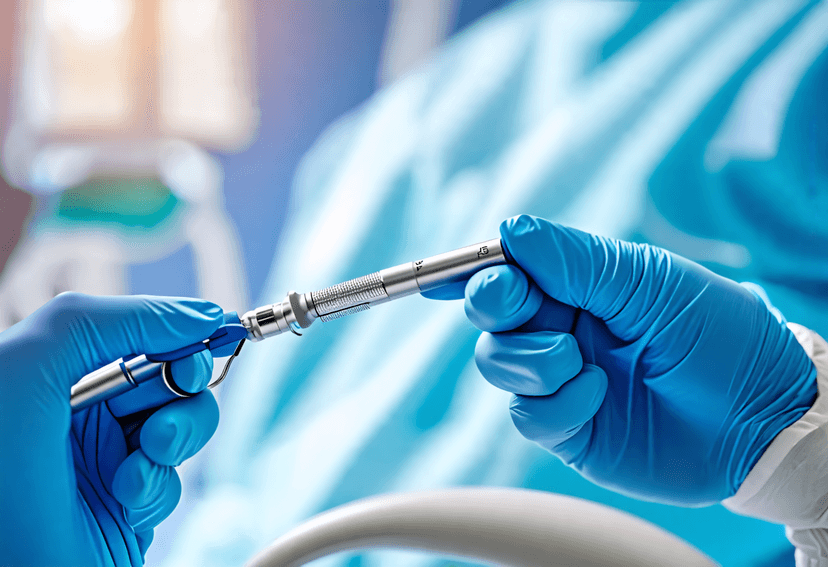
Worried About Vaginal Cancer? Here's How Early Detection Can Help
20 Nov, 2023
 Healthtrip Team
Healthtrip TeamVaginal cancer is a rare but serious health concern that affects women. While it may not be as well-known as other types of cancer, early detection is crucial for successful treatment and improved outcomes. In this blog, we will explore the risk factors associated with vaginal cancer, the importance of early detection, and the various screening methods available to help identify the disease at an early stage.
Vaginal cancer refers to the abnormal growth of cancerous cells in the vaginal tissues. It can develop in any part of the vagina but is most commonly found in the vaginal lining. The exact cause of vaginal cancer is not always clear, but several risk factors can increase a woman's likelihood of developing this condition.
Most popular procedures in India
Common Risk Factors for Vaginal Cancer:
1. Age: Vaginal cancer predominantly affects women over the age of 60. The risk of developing vaginal cancer increases with age.
Wellness Treatments
Give yourself the time to relax
Lowest Prices Guaranteed!

Lowest Prices Guaranteed!
2. HPV Infection: Human papillomavirus (HPV) infection poses a significant risk for vaginal cancer. HPV, a sexually transmitted virus, can lead to the formation of cancerous cells in the vaginal tissues. Reducing this risk involves getting the HPV vaccine and practicing safe sex.
3. Smoking: Tobacco use, including smoking, is strongly linked to a heightened risk of vaginal cancer. Smoking introduces carcinogens into the body, increasing the likelihood of cancerous cell development in the vagina.
4. DES Exposure: Women whose mothers took diethylstilbestrol (DES) during pregnancy may face an elevated risk of vaginal cancer. DES was a medication administered during mid-20th-century pregnancies, and its exposure has been associated with various health risks, including vaginal cancer.
5. History of Cervical or Vulvar Cancer: Women with a prior history of cervical or vulvar cancer may be at a greater risk of developing vaginal cancer. These cancers can occasionally spread to the vaginal tissues.
6. Weakened Immune System: Conditions or treatments that compromise the immune system, such as HIV/AIDS or organ transplantation, can heighten the susceptibility to vaginal cancer. A weakened immune system may struggle to control the growth of abnormal cells, increasing the risk.
These risk factors underscore the importance of vigilance and proactive healthcare measures, especially for women with these risk factors, to monitor their health and consider preventive measures and screenings to detect vaginal cancer early.
More to Explore :Vaginal Cancer Stages: A Simple Breakdown (healthtrip.com)
The Importance of Early Detection:
Early detection of vaginal cancer is crucial because:
- Improved Treatment Options: When vaginal cancer is detected early, treatment options are typically less invasive and more effective. Surgery, radiation therapy, and chemotherapy may be more successful in treating early-stage cancer.
- Higher Survival Rates: Early-stage vaginal cancer has a better prognosis, with higher survival rates compared to advanced-stage cancer. Timely treatment can increase the chances of a full recovery.
- Preserves Fertility: Early detection may allow for treatments that preserve a woman's fertility, which can be essential for younger patients. Preserving fertility can improve a woman's quality of life after cancer treatment.
Screening Methods for Vaginal Cancer:
Screening is essential for early detection of vaginal cancer, even though there is no standard screening test like mammograms for breast cancer or Pap smears for cervical cancer. Here are the methods used for assessing a woman's risk and detecting abnormalities:
- Pelvic Examination: Regular pelvic exams are essential for identifying any unusual changes in the vagina or cervix. During a pelvic exam, your healthcare provider may perform a visual inspection and palpate the vaginal tissues for abnormalities.
- Pap Smear: While not specifically for vaginal cancer, Pap smears may detect abnormal cells in the cervix or vagina, which can be indicative of cancer or pre-cancerous changes.
- Colposcopy: If an abnormality is detected during a pelvic exam or Pap smear, a colposcopy may be performed. This involves using a special microscope to closely examine the vaginal and cervical tissues for signs of cancer.
- Biopsy: If suspicious lesions or abnormalities are found during a colposcopy or pelvic exam, a biopsy may be taken to confirm the presence of cancerous cells. A biopsy involves removing a small tissue sample for examination.
- HPV Testing: Testing for high-risk HPV strains can help identify women at increased risk of vaginal cancer. This test can be done alongside a Pap smear.
- Imaging Tests: In advanced cases or when cancer is suspected to have spread, imaging tests like CT scans or MRI may be used to evaluate the extent of cancer and help plan treatment.
Regular screening and awareness of risk factors are essential in the early detection and prevention of vaginal cancer. Consult with your healthcare provider to determine the best screening schedule and methods based on your individual risk factors and medical history.
Related Blogs

Birthright: Empowering Women's Health and Wellness
Discover comprehensive healthcare services for women at Birthright, a renowned

Laparoscopic Hysteroscopy: A Minimally Invasive Diagnostic Tool
Explore the benefits of laparoscopic hysteroscopy, a minimally invasive diagnostic

Laparoscopic Hysterectomy: A New Era in Women's Health
Explore the benefits of laparoscopic hysterectomy, a minimally invasive surgical

Embracing Wholeness: A Journey to Women's Holistic Health
Discover the power of holistic health for women

Women's Health and Wellness Trends
The latest trends in women's holistic health and wellness

Mindfulness and Meditation for Women
The benefits of mindfulness and meditation for women's holistic health










